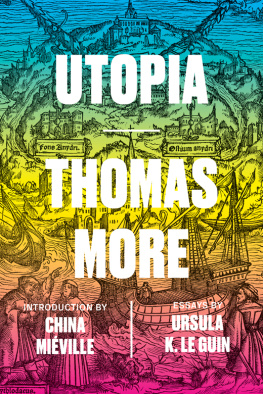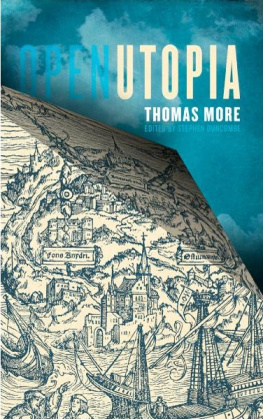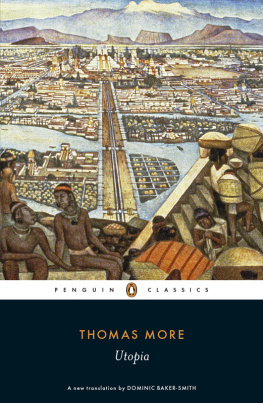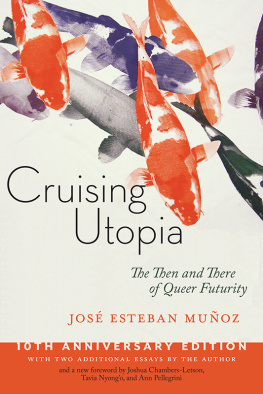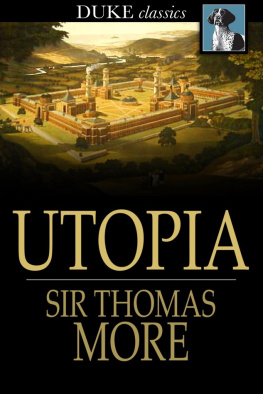
If you know from where to set sail, with a friendly pilot offering expertise, it should not take you too long to reach Utopia.
Since the first woman or man first yearned for a better place, dreamers have dreamed them at the tops of mountains and cradled in hidden valleys, above clouds and deep under the earth but above all they have imagined them on islands. The island utopia has been a standard since antique times: Eusebiuss Panchaea and Iambuluss Islands of the Sun; Henry Nevilles Isle of Pines, and Antangil, from the 1616 novel of that name; Bacons Bensalem; Robert Paltocks Nosmnbdsgrutt, from Peter Wilkins; Huxleys Pala; Austin Tappan Wrights Islandia; and countless more. And in the centre of that great archipelago of dissent and hope, one place, one name, looms largest.
This island, this book, is the paradigm. Mores Utopia, in the words of the scholar Roland Greene, is perhaps the text that establishes insularity as an early modern vantage [and] introduces a way of thinking that is properly called utopian, defined by a multifarious phenomenon which I will call island logic.
But, to repeat, it is not a long voyage to get there. Citizens of Mores Utopia keep up the art of navigation, pass back and forth on various tasks, trading surpluses of corn, honey, wool, flax, wood, wax, tallow, leather, and cattle to other nations. Only the thinnest stretch of ocean separates Utopia from the mainland. For somewhere so famously and constitutively nowhere, this no-place Utopia is very close to the shore.
And theres a more startling surprise with regard to its island-ness, a fact of which not nearly enough is generally made:
[T]his was no island at first, but a part of the continent. Utopus, that conquered it brought the rude and uncivilised inhabitants into good government Having soon subdued them, he designed to separate them from the continent, and to bring the sea quite round them. To accomplish this he ordered a deep channel to be dug and that the natives might not think he treated them like slaves, he not only forced the inhabitants, but also his own soldiers, to labour in carrying it on. As he set a vast number of men to work, he, beyond all mens expectations, brought it to a speedy conclusion. And his neighbours, who at first laughed at the folly of the undertaking, no sooner saw it brought to perfection than they were struck with admiration and terror.
This most famous example of the island utopia, the ideal-type itself, is not by nature an island at all. The fifteen miles of water that keep it apart from the main body politic are not there by Gods will, but by the sweat of native people, among others, digging at an invading conquerors command. The splendid utopian isolation is part of the violent imperial spoils.
The classic reactionary attack on the utopian impulse is that it is, precisely, no place, impossibly distant. But, disavowed and right there, in Mores foundation myth of the dream polity is a very different unease: that, wrought by brutality, coerced from above, it is all too close.
There could be no one better suited to frame Mores foundational text than that great dissident utopian and dissident-utopian thinker, Ursula K. Le Guin. In her words from Utopiyin, Utopiyang, which follows Mores text in this book, Every utopia since Utopia at least has also been, clearly or obscurely, actually or possibly, in the authors or in the readers judgement, both a good place and a bad one. Every eutopia contains a dystopia, every dystopia contains a eutopia.
These contradictions thrive in single heads as easily as between them, and in the texts those heads produce. The interminable debates about what More really meant miss this obvious fact, and are thus of as much use as any other discussion of actual artistic or political intent that treats it as a given or a secret to be decoded. Which is to say: some, but not much.
Was Mores utopia blueprint, or satire, or something else? As if these are exclusive. As if all utopias are not always all of the above, in degrees that vary as much in the context of their reception as of their creation.
The dangerous drive, the dystopia-in-utopia, then, is not only in the impulse, though it can certainly reside there, but in the actuality: that proximity of the island to the shore. Tragedians making their peace with power, liberals loudly warn against utopianism from below (often full of sentimentalism for their own dead radicalism, and lachrymose at their new realism); alongside them the hard-right radicals of power and oppression dream their own dreams of the good life: supremacist arcadias. And those who rule, more powerful and traditionally less voluble than their apologists, calmly configure and effect utopias of their own. In which those they rule have no choice but to live and serve and die.
These are a few of the limits of utopia (explored in the companion essay of that name that follows this one).
But the fact that the utopian impulse is always stained doesnt mean it can or should be denied or battened down. It is as inevitable as hate and anger and joy, and as necessary. Utopianism isnt hope, still less optimism: it is need, and it is desire. For recognition, like all desire, and/but for the specifics of its reveries and programmes, too; and above all for betterness tout court. For alterity, something other than the exhausting social lie. For rest. And when the cracks in history open wide enough, the impulse may even jimmy them a little wider.

